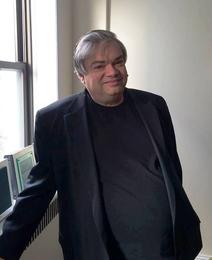 |
|
| Terry Teachout | |
Terry Teachout, a prolific author and cultural critic "who, in his columns for the Wall Street Journal, the Daily News and other publications, brought his all-encompassing intellect to bear on Broadway, ballet, bluegrass and practically every art form in between," died January 13, the New York Times reported. He was 65.
Teachout "was one of a vanishing breed of cultural mavens: omnivorous, humane, worldly without being pretentious, often leaning conservative in their politics but wholly liberal in how they approached the world and its dizzying array of peoples and cultures," the Times noted. "He wore his erudition lightly, enjoying it and hoping that, through his prose, others might as well."
Describing himself as a "well-informed amateur" and an aesthete, Teachout wrote several well-regarded biographies, including The Skeptic: A Life of H.L. Mencken (2002); Pops: A Life of Louis Armstrong (2009); and Duke: A Life of Duke Ellington (2013). His other titles include Beyond the Boom: New Voices on American Life, Culture, and Politics (1990); City Limits: Memories of a Small-Town Boy (1991); A Terry Teachout Reader (2004); and All in the Dances: A Brief Life of George Balanchine (2004). His one-man, one-act play, Satchmo at the Waldorf, premiered in 2011 in Orlando, Fla. He also wrote the librettos for three operas, all by the composer Paul Moravec.
"The older I get and the more completely I immerse myself in all the arts, the more certain I am that there's a larger, more fundamental sense in which they all seek to do the same thing," he said in a 2004 interview. "This deep resemblance means that I understand myself to be applying the same sort of aesthetic yardstick to, say, a ballet and a movie."
In a tribute, NPR's Scott Simon wrote: "Terry and I became friends out of our shared love of musicals, especially Sondheim, Thornton Wilder, jazz, the Midwest, and, I guess, because we both chronicled the loss of loved ones.... As a critic, Terry was more admiring than acerbic. He laughed out loud in previews, where critics were supposed to be inscrutable, and would often write me after he saw a production--it could just as easily be in Oregon as off-Broadway--to say, 'You've got to go. They are amazing each night in front of just 50 people.' He used social media to be kind and make friends. Terry believed that truly great works didn't squish you in the face with speeches and polemics, but let an audience wander, discover, breathe and live in each other's skins for a while."
"A masterpiece doesn't push you around," Teachout wrote. "It lets you make up your own mind about what it means--and change it as often as you like."

